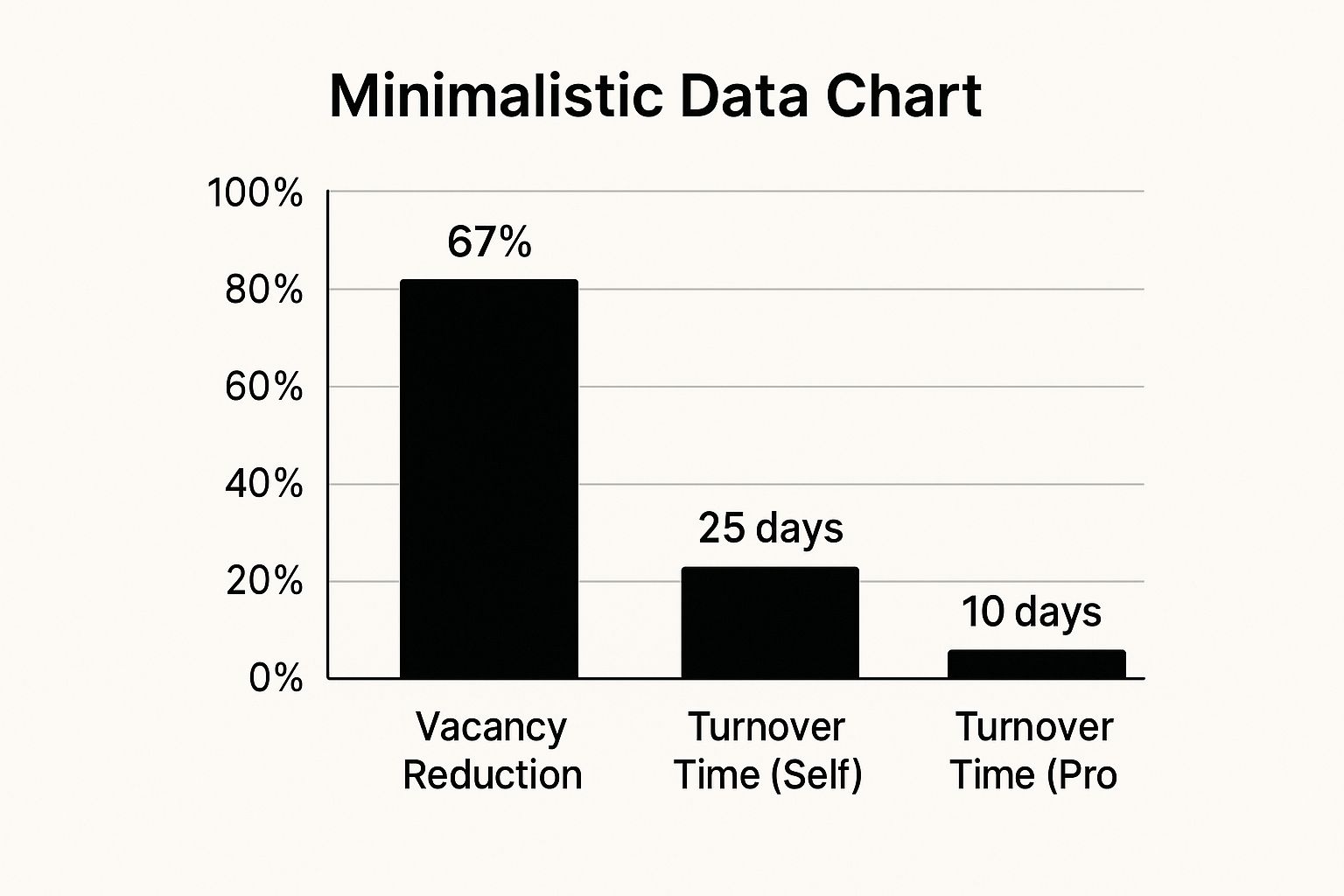7 Key Benefits of Property Management for Landlords in 2025
- Sarah Porter

- Sep 12, 2025
- 14 min read
Owning rental properties can be a powerful path to financial freedom, yet the day-to-day realities often derail the dream. Instead of enjoying passive income, many landlords find themselves burdened with late-night maintenance calls, difficult rent collections, and the complexities of landlord-tenant law. This hands-on involvement can quickly transform a strategic investment into an overwhelming, full-time job, eroding both personal time and potential profits. The key to reclaiming your investment's promise is a strategic partnership with a professional management team.
This guide moves beyond theory to provide a detailed breakdown of the tangible benefits of property management. We will explore seven critical areas where expert oversight transforms your rental business, from implementing a rigorous tenant screening process to ensuring strict legal compliance and mitigating costly risks. You will discover how professional management not only saves you significant time and reduces stress but also directly enhances your property's value and boosts your overall return on investment. Forget the landlord headaches; it's time to unlock the true potential of your rental portfolio by leveraging professional expertise for superior operational efficiency and financial performance.
1. Time Savings and Reduced Landlord Stress
One of the most significant benefits of property management is the immediate return on your most valuable, non-renewable resource: time. Being a landlord is far from a passive investment; it's a part-time job that often demands full-time attention. From late-night emergency calls about a burst pipe to the persistent follow-up required for rent collection, the operational demands can quickly consume your personal and professional life. A property manager steps in as your professional surrogate, handling every operational aspect of your investment.

This delegation frees you from the day-to-day grind, allowing you to focus on high-level strategy, source new investments, or simply enjoy personal activities without the constant stress of tenant management. For more insights on the extensive duties involved, you can explore this realistic guide on becoming a landlord.
Practical Scenarios
Consider these common investor profiles who benefit from this time-saving advantage:
The Out-of-State Investor: An owner living in a different city or state cannot realistically handle a 2 AM maintenance emergency or conduct in-person property inspections. A local management firm acts as their on-the-ground presence, ensuring the asset is protected.
The Busy Professional: A doctor, lawyer, or executive with a demanding career cannot afford to be interrupted by tenant calls or repair coordination. Outsourcing management allows them to grow their real estate portfolio without sacrificing their primary career focus.
The Portfolio Builder: An investor focused on scaling their holdings needs to spend their time analyzing deals and securing financing, not chasing down late rent payments for a single unit. A manager handles the existing portfolio, creating the bandwidth for growth.
Actionable Implementation Tips
To maximize time savings and minimize stress, establish clear operational boundaries with your property manager from the start:
Set Repair Thresholds: Authorize your manager to approve repairs up to a certain amount (e.g., $300) without needing your direct approval. This prevents minor issues from becoming communication bottlenecks.
Define Communication Protocols: Establish your preferred communication method (email, phone call) and frequency (monthly reports, urgent-only calls).
Clarify Emergency Procedures: Create a clear definition of what constitutes an "emergency" (e.g., fire, flood, no heat in winter) versus a non-urgent request to ensure you are only contacted for true crises.
2. Professional Tenant Screening and Placement
Securing a high-quality tenant is the bedrock of a profitable rental investment, and this is where professional management provides an enormous advantage. While a DIY landlord might run a basic credit check, a property management company deploys a rigorous, multi-layered screening process. This professional system digs deeper, verifying employment and income, analyzing past rental history, and conducting comprehensive criminal background checks to build a complete profile of each applicant. This systematic approach is one of the key benefits of property management, as it dramatically reduces the risk of late payments, property damage, and costly evictions.

This methodical vetting process ensures that only the most qualified and reliable tenants occupy your property, leading to more stable cash flow and fewer headaches. A professional manager’s experience and access to advanced screening tools provide a level of due diligence that is difficult for an individual owner to replicate. For a deeper look into the tools and techniques used, explore these professional tenant screening services.
Practical Scenarios
Consider how professional screening directly impacts rental outcomes:
Avoiding the Professional Tenant: Some individuals move from rental to rental, exploiting eviction moratoriums and legal loopholes. Experienced managers are trained to spot the red flags in rental histories that an independent landlord might miss, protecting owners from these serial offenders.
Ensuring Fair Housing Compliance: Landlords face a complex web of local, state, and federal fair housing laws. A property management company uses standardized, compliant screening criteria for all applicants, significantly reducing the risk of a costly discrimination lawsuit.
Verifying Income and Stability: A manager doesn't just take an applicant's word for their income. They verify it directly with employers and review pay stubs, ensuring the tenant has a stable financial foundation to consistently meet their rent obligations, which is crucial for long-term investment success.
Actionable Implementation Tips
To get the most out of your manager's screening process, work with them to define your criteria:
Establish Clear Tenant Criteria: Before marketing the property, agree on minimum requirements for credit score, income-to-rent ratio (e.g., 3x the monthly rent), and rental history.
Review and Understand the Report: Ask your manager to walk you through the first few screening reports so you understand what they look for and why an applicant was approved or denied.
Require Renters Insurance: Make renters insurance a mandatory clause in your lease agreement. This protects your asset and reduces your liability in case of tenant-caused damage.
3. Efficient Rent Collection and Financial Management
Consistent cash flow is the lifeblood of any rental investment, and nothing disrupts it more than inconsistent or late rent payments. One of the core benefits of property management is the implementation of a professional, systematic approach to rent collection. Experienced managers remove the personal and often awkward dynamic of chasing payments, treating rent collection as a strict business process. They leverage technology and firm policies to ensure timely payments, which directly impacts your bottom line.
This structured approach transforms your financial operations from a reactive headache into a predictable, well-oiled machine. Managers handle everything from sending automated reminders and processing online payments to assessing late fees and, if necessary, initiating the legal eviction process. This consistency not only improves cash flow but also provides clear, detailed financial records, simplifying accounting and tax preparation.
Practical Scenarios
Consider how professional financial management solves common landlord challenges:
The Conflict-Averse Owner: An investor who dislikes confrontation may let late payments slide to avoid difficult conversations. A property manager acts as an impartial enforcer of the lease terms, collecting rent and fees without emotional involvement.
The Disorganized Investor: An owner managing multiple properties with spreadsheets may struggle with accurate expense tracking and profit-and-loss statements. A manager uses specialized software (like those with QuickBooks integration) to provide clear, monthly financial reports.
The High-Volume Landlord: As a portfolio grows, tracking individual payments, security deposits, and expenses becomes exponentially more complex. A management company centralizes these financial tasks, ensuring nothing falls through the cracks and providing a consolidated view of the portfolio's performance.
Actionable Implementation Tips
To ensure you are leveraging the full financial benefits of property management, take these steps:
Review Collection Policies: Before signing, ask for the manager's documented rent collection process, including their average collection rate and their policy on late fees and delinquencies.
Clarify Financial Reporting: Request a sample of their monthly owner statement. Ensure it clearly details all income, itemizes every expense with attached receipts, and shows your net distribution.
Establish Payout Schedules: Confirm the exact schedule for owner distributions. A professional manager should be able to guarantee a consistent date each month (e.g., by the 15th) for transferring funds to your account.
Verify Tech Platforms: Ask what software they use for tenant payments and owner reporting. Modern platforms like Yardi or AppFolio offer online portals that provide both you and your tenants with 24/7 access to financial information.
4. Expert Maintenance and Property Preservation
One of the most critical benefits of property management is gaining access to a professional, cost-effective maintenance ecosystem. For a solo landlord, finding a reliable plumber on a holiday weekend is both stressful and expensive. Property management companies, however, cultivate extensive networks of licensed, insured, and vetted contractors. They leverage their volume of work to negotiate competitive pricing and priority service, translating into significant savings and faster response times for your property. This professional oversight ensures that all work, from routine repairs to major renovations, meets local codes and quality standards, which is crucial for preserving your asset's long-term value.

This system transforms maintenance from a reactive, costly scramble into a proactive, strategic component of your investment plan. A property manager implements preventive maintenance schedules for crucial systems like HVAC and roofing, identifying minor issues before they escalate into expensive emergencies. This approach not only protects your bottom line but also enhances tenant satisfaction and retention. Regular upkeep and inspections are key, as detailed in this helpful guide to rental property inspections.
Practical Scenarios
Consider how professional maintenance coordination provides a tangible return on investment:
Proactive System Upkeep: A management company’s scheduled HVAC servicing program can reduce emergency repair calls by up to 40%, preventing tenant discomfort and avoiding premium charges for after-hours work.
Bulk Purchasing Power: When multiple properties need new appliances or flooring, a manager can leverage bulk purchasing agreements to save 15-25% on materials compared to what an individual owner would pay at retail.
Asset Longevity: A manager's preventive maintenance plan, including regular gutter cleaning and roof inspections, can extend the functional life of a roof by 5-10 years, delaying a major capital expenditure.
Actionable Implementation Tips
To ensure your property is maintained effectively while controlling costs, work with your manager to establish clear guidelines:
Establish Spending Limits: Authorize your manager to handle repairs up to a pre-approved amount (e.g., $400) independently but require your approval for any expense exceeding that threshold.
Request Maintenance Reports: Ask for monthly or quarterly reports detailing all maintenance requests, work performed, costs incurred, and the status of any scheduled preventive tasks.
Verify Vendor Credentials: Confirm that your management company only uses licensed and fully insured contractors to protect you from liability.
Set Emergency Protocols: Clearly define what constitutes an emergency requiring immediate action (e.g., major leak, loss of heat in winter) versus a standard repair request.
5. Legal Compliance and Risk Mitigation
One of the most complex and high-stakes benefits of property management is navigating the dense web of landlord-tenant laws. These regulations are constantly evolving on federal, state, and local levels, creating a legal minefield for independent landlords. A professional property manager invests heavily in ongoing education to stay current on fair housing laws, eviction procedures, safety codes, and disclosure requirements. This specialized knowledge is a critical shield against devastating legal and financial penalties.
Their expertise protects you from unintentional violations that can lead to costly lawsuits, significant fines, and reputational damage. From proper security deposit handling to non-discriminatory tenant screening, a manager ensures every step of the rental process is executed by the book, mitigating your liability as an owner.
Practical Scenarios
Consider how this legal expertise plays out in common, high-risk situations:
Avoiding Fair Housing Violations: A landlord unknowingly asks a seemingly innocent question during a showing, such as, "Do you have children?" This can be interpreted as discriminatory and lead to a Fair Housing complaint with potential fines exceeding $10,000. A trained manager knows to only ask legally permissible questions based on standardized, objective criteria.
Executing a Lawful Eviction: An owner attempts to evict a non-paying tenant but fails to provide the legally required notice period or files incorrect paperwork. The case is dismissed, forcing the owner to restart the process while the tenant continues to live rent-free for months. A property manager follows precise legal protocols to ensure the eviction is executed efficiently and lawfully.
Proper Safety Disclosures: A property built before 1978 requires a specific lead-based paint disclosure. Forgetting this step can result in severe EPA penalties. A manager has standardized processes to ensure all required disclosures, from lead paint to mold, are provided and documented correctly.
Actionable Implementation Tips
To leverage your manager's legal expertise and ensure your asset is protected, implement these clear guidelines:
Verify Compliance Training: Inquire about their team's certifications and ongoing legal education. Ask how they stay informed about recent changes in local and state rental laws.
Review Standard Forms: Request to see copies of their standard lease agreements, addendums, and tenant notices. Ensure these documents are attorney-reviewed and specific to your jurisdiction.
Confirm Insurance Coverage: Ensure your property manager carries adequate Errors and Omissions (E&O) and general liability insurance. This provides a crucial layer of financial protection for both parties.
Document Everything: Reinforce a policy of documenting all significant communications with tenants. A professional manager will already do this, creating a vital paper trail if a dispute ever arises.
6. Maximized Property Value and Strategic Improvements
A rental property is more than just a source of monthly income; it's a significant financial asset that should appreciate over time. One of the most overlooked benefits of property management is their role in actively enhancing your asset's long-term value. An experienced manager doesn't just maintain the status quo; they conduct regular property assessments and market analyses to identify strategic, value-add opportunities. They understand which upgrades yield the highest ROI in your specific submarket.
This proactive approach moves beyond simple rent collection to active asset management. A good manager knows whether a minor kitchen renovation or an energy-efficient window upgrade will attract a better quality tenant, command higher rent, and ultimately increase the property's sale value. This strategic guidance helps ensure your capital improvements are investments, not just expenses.
Practical Scenarios
Consider how this benefit applies to different investment goals:
The "Fix-and-Hold" Investor: An investor purchases an undervalued property needing updates. A property manager can oversee cost-effective renovations, such as modernizing a kitchen, which could increase monthly rent by 15-20% and significantly boost the property's appraisal value.
The Competitiveness-Focused Owner: In a market with new apartment construction, an older property can lose its appeal. A manager might recommend adding desirable amenities like smart-home features or improving landscaping, which can increase curb appeal and overall property value by 5-10%.
The Long-Term Wealth Builder: An owner plans to hold a property for decades. The manager advises on durable, high-ROI improvements like installing energy-efficient appliances or upgrading to a more resilient roofing material, reducing long-term maintenance costs and justifying gradual rent increases.
Actionable Implementation Tips
To leverage your manager's expertise for asset growth, implement these strategies:
Request Regular Market Analyses: Ask your property manager for an annual or bi-annual report comparing your property's rent, features, and condition to local competitors.
Evaluate Improvement ROI Carefully: Before committing to a major upgrade, work with your manager to project the potential rent increase and calculate the return on investment.
Phase Improvements Strategically: For larger projects, plan renovations to occur during tenant turnover to minimize vacancy loss and disruption.
Track Performance Metrics: Monitor key metrics pre- and post-improvement, such as vacancy rates, average tenancy duration, and net operating income, to quantify the impact of your investment.
7. Reduced Vacancy Rates and Faster Tenant Turnover
Every day a rental property sits empty, it represents direct, unrecoverable financial loss. One of the most impactful benefits of property management is the strategic reduction of these costly vacancy periods. Professional managers are experts in the tenant turnover process, employing a multi-faceted approach that includes aggressive marketing, strategic pricing, and efficient property preparation to attract qualified tenants faster than a self-managing owner typically can. Their entire business model is built on minimizing downtime and maximizing occupancy.
This expertise translates into a streamlined system. Managers know the local market rental rates, utilize high-quality photography, write compelling listings, and syndicate them across numerous high-traffic platforms. They also manage showings and applications with professional efficiency, ensuring the time from a tenant moving out to a new one moving in is as short as possible. This proactive approach directly protects your cash flow and enhances your investment's annual return.
Practical Scenarios
Different rental situations highlight the value of professional vacancy management:
Competitive Rental Markets: In an area with many similar available units, a property manager’s professional marketing, including staging and superior online listings, can make a property stand out and rent faster, preventing it from languishing on the market.
Off-Season Turnovers: A lease ending in a historically slow rental month (e.g., December) poses a significant risk. A manager can anticipate this and begin marketing efforts well in advance, pre-leasing the unit to avoid a costly winter vacancy.
The First-Time Landlord: A new investor may not know how to price their unit correctly or where to advertise effectively. A property manager eliminates this learning curve, applying proven strategies from day one to secure a tenant quickly and avoid common, costly mistakes.
The following bar chart visualizes the dramatic impact professional management can have on key vacancy metrics.

As the data clearly illustrates, professional management not only slashes overall vacancy but also cuts the average turnover time by more than half, from 25 days down to just 10.
Actionable Implementation Tips
To collaborate effectively with your manager on reducing vacancy, focus on these key areas:
Establish a Pre-Marketing Window: Authorize your manager to begin marketing the property 30 to 60 days before the current lease ends. This allows them to secure a new tenant before the unit is even empty.
Approve a "Rent-Ready" Budget: Set aside a small, pre-approved budget for minor turnover tasks like professional cleaning, paint touch-ups, and carpet cleaning. This empowers your manager to make the property show-ready immediately.
Review Market Analysis: Ask for a comparative market analysis (CMA) when setting the rent. This data-driven approach ensures the price is competitive enough to attract applicants without leaving money on the table.
Benefits Comparison of 7 Property Management Aspects
Aspect | Time Savings & Reduced Stress | Tenant Screening & Placement | Rent Collection & Financial Management | Expert Maintenance & Property Preservation | Legal Compliance & Risk Mitigation | Maximized Property Value & Strategic Improvements | Reduced Vacancy Rates & Faster Tenant Turnover |
|---|---|---|---|---|---|---|---|
Implementation Complexity 🔄 | Moderate: Coordination with management firm | High: Multi-layered screening process | Moderate: Setup of automated payment systems | Moderate: Managing contractor networks | High: Ongoing regulatory monitoring and training | Moderate: Requires market analysis and planning | Moderate: Requires marketing and turnover process |
Resource Requirements ⚡ | External management team | Screening software and databases | Payment platforms and accounting tools | Contractor network and maintenance scheduling | Legal expertise and compliance tools | Market data and inspection resources | Marketing tools and tenant coordination |
Expected Outcomes 📊 | ⭐⭐⭐⭐ Significant time savings, reduced stress | ⭐⭐⭐⭐⭐ Higher quality tenants, fewer evictions | ⭐⭐⭐⭐ Improved rent collection, better financials | ⭐⭐⭐⭐ Lower maintenance costs, faster repairs | ⭐⭐⭐⭐⭐ Reduced legal risks, compliance assurance | ⭐⭐⭐⭐ Increased value, rent optimization | ⭐⭐⭐⭐ Reduced vacancy, faster tenant placement |
Ideal Use Cases 💡 | Busy landlords, out-of-state investors | Landlords needing reliable tenant placement | Landlords seeking streamlined financial handling | Owners looking to preserve property value | Landlords in regulated markets/facing legal risks | Investors focused on long-term value growth | Properties with high turnover or vacancy issues |
Key Advantages ⭐ | Saves 10-20 hrs/month, stress relief | Thorough vetting, compliance with fair housing | Automated payments, detailed financial reports | Contractor discounts, quality control | Legal protection, updated with laws | Strategic improvements, ROI-focused | Multi-channel marketing, optimized pricing |
Is Professional Management Your Next Best Investment?
Navigating the landscape of rental property ownership is a journey filled with both significant opportunities and complex challenges. As we've explored, the decision to partner with a professional property manager is not merely about offloading tasks; it's a strategic business decision aimed at optimizing every facet of your investment. The cumulative benefits of property management create a powerful value proposition that extends far beyond simple convenience.
You reclaim your most valuable asset, your time, by delegating the relentless demands of tenant communication, maintenance coordination, and administrative follow-up. This freedom allows you to focus on high-level strategy, portfolio growth, or simply enjoying the fruits of your investment without the operational headaches.
From Reactive Landlord to Proactive Investor
The true transformation lies in shifting from a reactive landlord to a proactive, strategic investor. A professional manager introduces systems and expertise that institutionalize success.
Mitigated Risks: Instead of worrying about Fair Housing Act violations or the latest eviction moratorium, you gain a partner who navigates the complex legal landscape on your behalf.
Optimized Finances: Consistent rent collection, detailed financial reporting, and strategic budgeting turn your property's cash flow from an unpredictable variable into a reliable income stream.
Preserved Asset Value: Proactive maintenance and targeted capital improvements do more than just fix what's broken; they actively preserve and enhance the long-term value of your physical asset.
Ultimately, the most significant benefit is peace of mind. Knowing your property is in the hands of experts who excel at tenant screening, vacancy reduction, and financial oversight allows you to step back with confidence. You are no longer just a landlord putting out fires; you are the CEO of a well-oiled investment vehicle.
The Clear Path to Passive Income
The path to turning a rental property into a truly passive, high-performing asset is paved with professional expertise. By leveraging the skills of a dedicated management team, you unlock the full potential of your investment, maximizing rental income while minimizing vacancies and costly mistakes. This strategic partnership is what separates a stressful side hustle from a thriving, scalable real estate business. The question isn't whether you can afford property management, but whether you can afford the risks, stress, and lost opportunities of going it alone. Embracing professional management is the definitive step toward achieving your long-term financial goals.
Ready to experience the comprehensive benefits of property management firsthand? At Keshman Property Management, we transform your property from a source of stress into a high-performing, passive asset. Visit Keshman Property Management to learn how our transparent, expert-led services can help you maximize your return on investment.

Comments